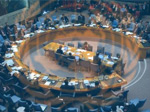Morocco presented Sahara draft autonomy proposal to UNSC Tuesday
 Rabat, Apr.9 – Morocco will present its plan to grant substantial autonomy to its Southern Provinces (the Sahara) to the UN Security Council on April 10, official sources announced here Monday.
Rabat, Apr.9 – Morocco will present its plan to grant substantial autonomy to its Southern Provinces (the Sahara) to the UN Security Council on April 10, official sources announced here Monday.
art of this initiative, Moroccan Prime Minister, Driss Jettou is holding -until Wednesday- a series of meetings with political parties and local media to explain the broad lines of this proposal that the North African country hopes will put an end to the three decade-old dispute with the Algerian-backed separatist movement "Polisario".The latter is claiming the independence of the former Spanish colony that was ceded to Morocco in 1975 under the Madrid Accords.Morocco has in the past few weeks dispatched several delegations of senior officials to Europe, Africa, America, Asia and Arab countries part of a worldwide diplomatic campaign to drum up support for the proposal.Several countries such as France, Spain, the United States, Italy, Mexico, Comoros and Portugal "commended" the Moroccan initiative and expressed their "support" to Morocco's efforts to find a final solution to the conflict within the framework of the United Nations.The UN Security Council (UNSC) is due to debate the Sahara issue on April 20, whereas the UN Secretary General report on the Sahara will be submitted to UNSC members on April 16.
The Moroccan proposal is in line with the relevant international standards, and respects the regional specificities and the expectations of the local populations.
The former Spanish colony was retrieved by Morocco in 1975 under the Madrid accord. The Polisario, which proclaimed the so-called Sahraoui Republic on the Algerian territory, is claiming independence of the Sahara.{mosimage}Prior to coming under the protectorate of two colonial powers, France and Spain, Morocco had to gradually and in successive steps, recuperate the part of the territory under Spanish administration, beginning with the North and Tangier in 1956, Tarfaya and Tan Tan in 1958, Sidi Ifni in 1969 and the Sahara in 1975. This is written in course of history.
The adversaries of Morocco, who aided and abetted the conflict in the Sahara and opposed Morocco’s territorial integrity by finding and helping the polisario, prepare in advance this opposition to Morocco.
This lead to Algeria’s acceptance of this movement on its territory in Tindouf, due to the differences exiting at that time between Morocco and Algeria with regard to common borders and when Morocco signed an agreement with Spain in compliance with the historical relations that had always existed between the two countries.
With Morocco having recovered its southern provinces, the polisario found nothing better to do than to park the sahraoui population in camps set up on Algerian territory, called refugee camps.
The polisario lied and manipulated the segment of the population placed in Tindouf, Algeria.
The existence of the polisario is connected to the very existence of these camps, and the very existence of these camps on a hostile territory in subhuman conditions over such a long period is a flagrant infringement of human rights.
The polisario has constantly and deliberately violated the most elementary human rights for over 30 years.
Today, history enables the polisario to open the road to hope, to make people forget the suffering, the errors and moral failures of the past.
Today, history offers a golden opportunity for the polisario to accept the only solution possible, indeed the best one, i.e. political autonomy under the sovereignty of the kingdom of Morocco.
It was indeed 31 years ago that 350,000 Moroccans took part in the green march to peacefully liberate the provinces. The Saharan provinces where then deprived of the most basic facilities of water, telecommunications, health, roads, ports and airports.
Since 1975, when morocco recovered the territories, the difference is clear. This part of Moroccan territory is now enjoying a high level of development. Indeed, huge efforts were exerted to enable the populations lead a decent life and enjoy all modern facilities.
